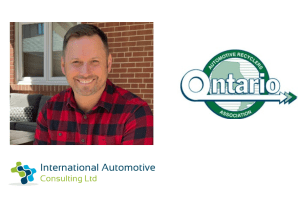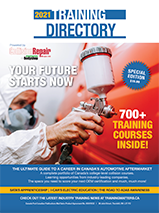 Regina Saskatchewan–May 11 2010–The Saskatchewan auto recycling industry does its part for the environment. That isn’t in dispute.
Regina Saskatchewan–May 11 2010–The Saskatchewan auto recycling industry does its part for the environment. That isn’t in dispute.
Salvaging the usable parts from discarded vehicles then disposing of its toxic elements and the rest of its unusable parts in a safe way is definitely good for the environment. But making a profit doing it is the green part of the equation that often doesn’t add up.
That’s why Saskatchewan Government Insurance (SGI) invited auto recyclers from around the province to Regina on April 9 to learn how to put the other green back into the equation.
“The recycler with the lowest overhead wins” said keynote speaker Jim Counts–a world-renowned auto recycling consultant–to the auto recyclers and SGI salvage managers gathered in Regina for the day-long meeting.
He suggested the auto recycling industry focuses too much on the small cheap parts and servicing their community rather than being a sound profitable business.
“Selling low-end parts will keep you a small business and keep your profits down” Counts said adding that recyclers who worry they won’t have a lug nut when someone needs it aren’t considering that those are the same people who will show up to buy things cheap when you’re going out of business.
“I object [to the idea] that a business has an obligation to its community” he said of the belief that auto recyclers must perform some kind of community service for the public. “A good business makes a profit” Counts said.
Instead he told the Saskatchewan recyclers to “do the math.” He suggested they take the total cost of running their business for one year–including everything from taxes and salaries to utility and fuel costs–and divide that by the number of vehicles they process. That will give them their average price to process a vehicle or their overhead per vehicle.
His lesson was to decrease the overhead per vehicle by finding efficiencies in the selling and recycling of the vehicles and not holding on to vehicles too long.
Counts said many recyclers also have too many employees which keeps the overhead too high. He suggested that incentive pay for breaking down vehicles be offered to get the most of our employees and in the end increase the number of vehicles they are able to process per month.
In the end he said his message wasn’t to make everyone change their business.
“I want you to be bigger if you want to be bigger” he said. For the Saskatchewan auto recyclers at the meeting the message didn’t fall on deaf ears but there was some skepticism that his big business ideas would work in Saskatchewan.
“It’s a personal choice. Some in it want to stay small and some want to be big” said Keith Kabay of All Parts Automotive in Regina who attended the meeting with his wife and business partner Susan. “When you’re in business you can’t have inefficiencies. Everyone is in it to make a living.”
However the Kabay’s agreed that Counts’s message might change some things they do.
“I’ve learned to do projections doing the math” said Susan Kabay who looks after the books. “The presentation was beneficial. But because we’re a smaller company our overhead is low which makes a difference. The revenue pressures are not there.”
She suggested that once they’ve taken a look at the numbers they can “make decisions as to where we need to make changes.”
“He’s really got me thinking” she said. “It’s not falling on deaf ears but it’s like comparing apples and oranges.”
The meeting the 10th hosted by SGI for auto recyclers is a way of bringing businesses and partners together to discuss the challenges and future of the industry.
“The auto recyclers are an important customer and partner of SGI so it only makes sense for us to provide them with a way to communicate with us as a group” said Cheryl Hoimyr a manager with SGI Salvage in Regina. “By sharing innovative thoughts and solutions to challenges we can help make the industry in the province even stronger.”
SGI plans on hosting another event in 2011.
Meeting notes:
The meeting wasn’t all food for thought. Janet Taylor a representative from the Summerhill Group’s (formerly the Clean Air Foundation) Switch Out Program gave a short presentation on the recycling of mercury switches in convenience light and ABS assemblies. Their message was: “Every single switch counts.”
The auto recyclers pointed out that there’s a gap in the program for collision repair shops who might replace a defective assembly but have no knowledge of how to or a way of recycling the mercury switches. Keith Kabay also shared with the Summerhill Group that a $20 core charge is being applied to some aftermarket assemblies to cover the recycling which caught the program representative’s attention.
The Saskatchewan Scrap Tire Corporation’s executive director Theresa McQuoid also addressed attendees regarding Phase III of its tire stockpile collection program which will allow auto recyclers in the province a one time no cost collection of all stockpiled used tires. The auto recyclers had many questions around the collection of the used tires and what they can and should do with the tires in the future. Fear that fines for stockpiling tires and recyclers would have to pay to dispose of the tires topped their concerns.
Saskatchewan’s participation in the Retire Your Ride program was outlined in a presentation from Allyson Brady of the Saskatchewan Environmental Society including what recyclers who participated could and couldn’t remove and resell–all in relation to smog production. She told auto recyclers that as of February 2010 there had been more than 2000 vehicles retired in Saskatchewan–that represented about 1800 for 2009; their target was 500.


























